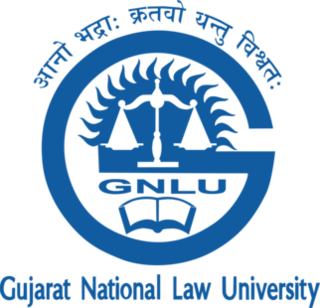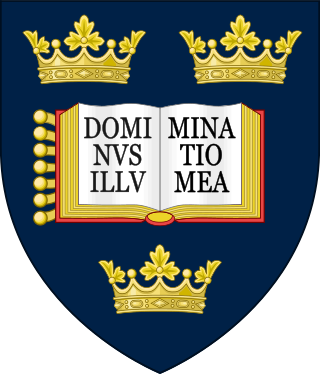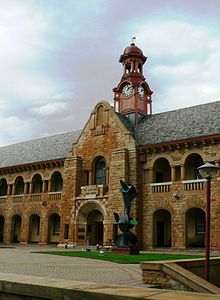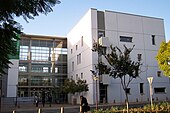
Pretoria is South Africa's administrative capital, serving as the seat of the executive branch of government, and as the host to all foreign embassies to South Africa.
Moot court is a co-curricular activity at many law schools. Participants take part in simulated court or arbitration proceedings, usually involving drafting memorials or memoranda and participating in oral argument. In many countries, the phrase "moot court" may be shortened to simply "moot" or "mooting". Participants are either referred to as "mooters" or, less conventionally, "mooties".

The Gujarat National Law University (GNLU) is a pre-eminent public law school and a National Law University established under the Gujarat National Law University Act, 2003 in the state of Gujarat. The university is located at Gandhinagar, which is the capital of Gujarat and is located 23 kilometers north of the city of Ahmedabad. The statute provides for the Chief Justice of India or a Senior Supreme Court Judge to serve as the Visitor of the university.

The National University of Advanced Legal Studies (NUALS) is a public law school and a National Law University located in Kochi, India. It is the first and only National Law University in the State of Kerala and one of the 25 NLUs in India. Admissions to the university are done on the basis of the Common Law Admission Test.
The University of Pretoria Faculty of Law was established in 1908. It consists of six academic departments, six centres, two law clinics, and the Pretoria University Law Press (PULP). This faculty ranked best in Africa for the fourth year in a row with leading Departments of Jurisprudence; Mercantile Law; Private Law; Procedural Law; Public Law; and Centre for Human Rights. The faculty offers the undergraduate LLB degree, and postgraduate LLM/MPhil and LLD/PhD degrees.
Yvonne Mokgoro is a former justice of the Constitutional Court of South Africa.
Johann van der Westhuizen (born 26 May 1952 in Windhoek, South West Africa is a former judge of the Constitutional Court of South Africa. Before his judicial appointment, he was a professor at the University of Pretoria Faculty of Law and the founding director of its Centre for Human Rights.
The African Human Rights Moot Court Competition is an international moot court competition with a special focus on human rights in Africa. The competition is organised by the Centre for Human Rights, based at the University of Pretoria Faculty of Law in South Africa. Each year, the competition is hosted by a Law Faculty from a different African country. Since its inception in 1992, the competition has had 845 participant teams originating from 125 universities from 45 African countries.

The University of Pretoria is a multi-campus public research university in Pretoria, the administrative and de facto capital of South Africa. The university was established in 1908 as the Pretoria campus of the Johannesburg-based Transvaal University College and is the fourth South African institution in continuous operation to be awarded university status. The university has grown from the original 32 students in a single late Victorian house to approximately 53,000 in 2019. The university was built on seven suburban campuses on 1,190 hectares.

The Nelson Mandela World Human Rights Moot Court Competition is a moot court competition on international human rights law. In 2009, the University of Pretoria Faculty of Law's Centre for Human Rights, with the assistance of the Office of the United Nations High Commissioner for Human Rights, organised the inaugural edition. Previously, the oral rounds of the competition were held annually in Pretoria, the administrative and de facto capital of South Africa. In more recent years, the competition has been held in Geneva, where the United Nations is headquartered.
More than pure aspirations, human rights are real rights that can be tested in courts of law. The World Human Rights Moot Court Competition is an exciting way for students from around the world to deepen their knowledge of rights and learn from each other.

The Centre for Human Rights at the University of Pretoria Faculty of Law, South Africa, is an organisation dedicated to promoting human rights on the continent of Africa. The centre, founded in 1986, promotes human rights through educational outreach, including multinational conferences, seminars and publications such as Human Rights Law in Africa, The African Human Rights Law Journal, the African Human Rights Law Reports and The Constitutional Law of South Africa. The centre, which was founded during Apartheid, assisted in adapting a Bill of Rights for South Africa and contributed to creating the South African Constitution. In 2006, the centre received the UNESCO Prize for Human Rights Education, particular recognising for the LLM in Human Rights and Democratisation in Africa and the African Human Rights Moot Court Competition.
The South African Business Schools Association (SABSA) is an association of South African business schools offering accredited MBA programmes. Institutions are accredited in South Africa by the Council on Higher Education (CHE), whilst institutions also pursue international accreditation from AMBA, EQUIS and AACSB.
The University of Pretoria Faculty of Engineering, the Built Environment and Information Technology educational programs stretch back to 1908 and consists of the School of Engineering, School for the Built Environment, School of Information Technology and the Graduate School of Technology Management. The university is the only African collaborator in the CDIO engineering initiative: Since 1997, the university as a whole has produced more research outputs every year than any other institution of higher learning in South Africa, as measured by the Department of Education's accreditation benchmark.

The Price Media Law Moot Court Competition or Price Moot in short, is an annual international moot court competition. Described as a competition "for raising the profile of freedom of expression by bringing informed and effective debate and discussion on significant issues of information flows and technology to many parts of the world", the Price Moot focuses on international media law and related human rights such as freedom of expression, freedom of religion, freedom of association, and various facets of privacy. The main sources of law engaged include the Universal Declaration of Human Rights, European Convention on Human Rights, and the International Covenant of Civil and Political Rights. Recurring topics include online hate speech and the responsibility of internet intermediaries. With more than a hundred teams taking part annually, the Price Moot is the world's largest competition in its field and is considered one of the grand slam or major moots.
Lyttelton Manor High School is a public English medium co-educational high school situated in the suburb of Lyttelton Manor in the town of Centurion in the Gauteng province of South Africa. The high school was established in 1962.
The LAWASIA International Moot Competition is an annual international moot court competition that is organised by LAWASIA, an international organisation mainly comprising bar associations, lawyers, judges, and academics. The moot problem ranges from international human rights to international commercial arbitration, and the venue of the competition rotates between LAWASIA member states as it is usually held in conjunction with the annual LAWASIA Conference. Around 30 to 40 law schools from around the world take part in the moot each year; Malaysia is the only member state that conducts national rounds, of which the top two team teams — each university can send multiple teams — are selected for the international rounds. In the international rounds, teams would compete in up to ten rounds if they reach the championship final, which is usually judged by notable judges and practitioners.

The Deutsche Internationale Schule Pretoria (DSP) is a German and English-medium school in The Willows, Pretoria, South Africa.

The John H. Jackson Moot Court Competition. is an international moot court competition on WTO law. The competition takes place on a yearly basis, with its first edition dating back to 2002. The competition was formerly known as ELSA Moot Court Competition on WTO but has been renamed in 2018 after the American professor of law John Howard Jackson.
Ruvimbo Samanga is a Zimbabwean scholar and lawyer working with the Space Law & Policy. Samanga was the National Point of Contact in Zimbabwe under the Space Generation Advisory Council, which works in collaboration with the United Nations' Programme on Space Applications. She has held Research positions at the Open Lunar Foundation and served as a Ban Ki Moon Global Scholar.














